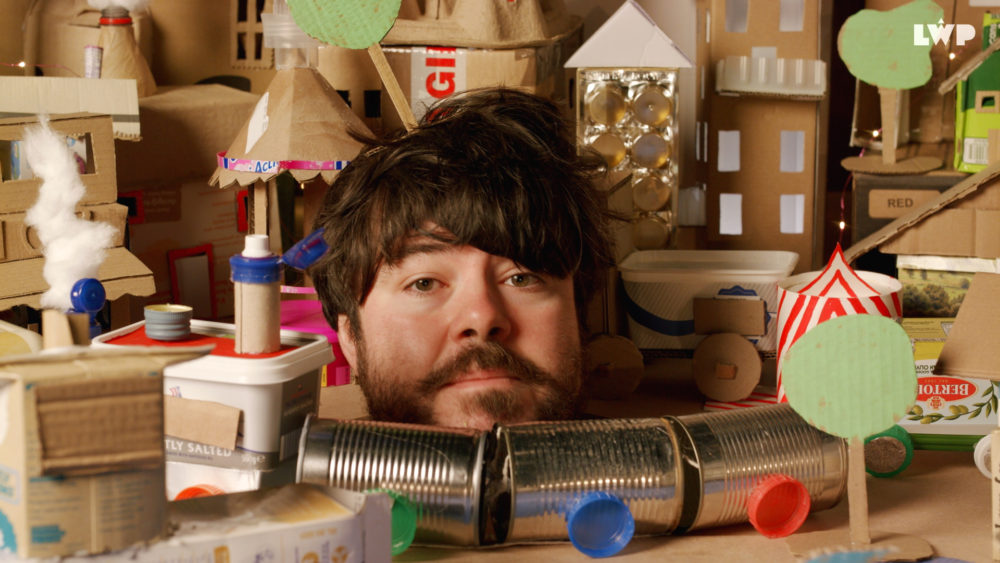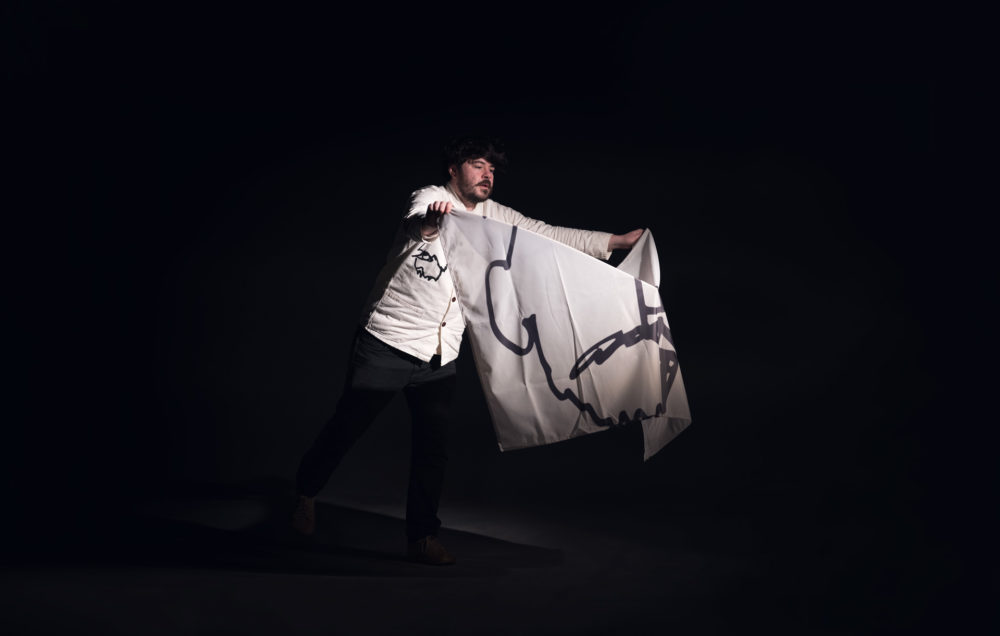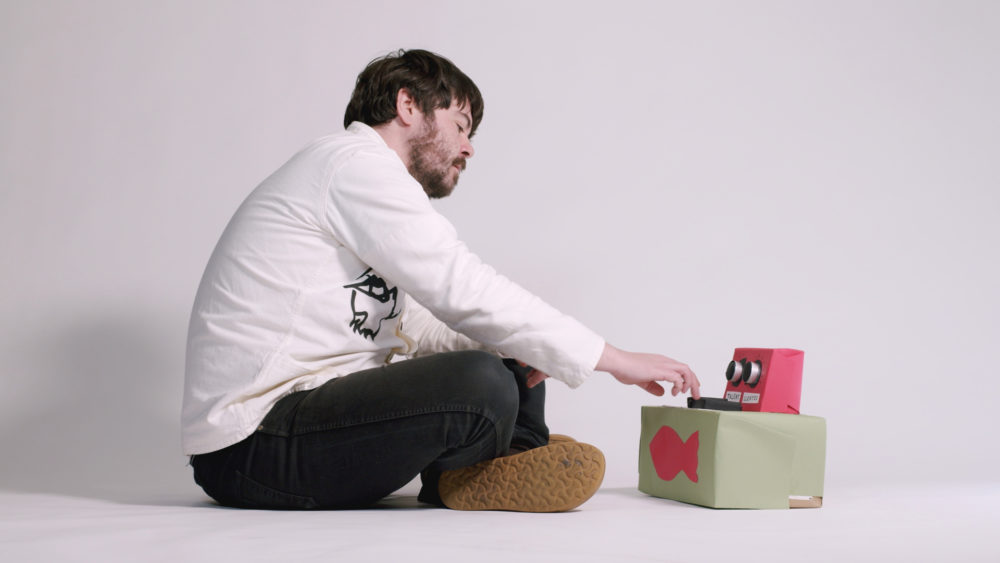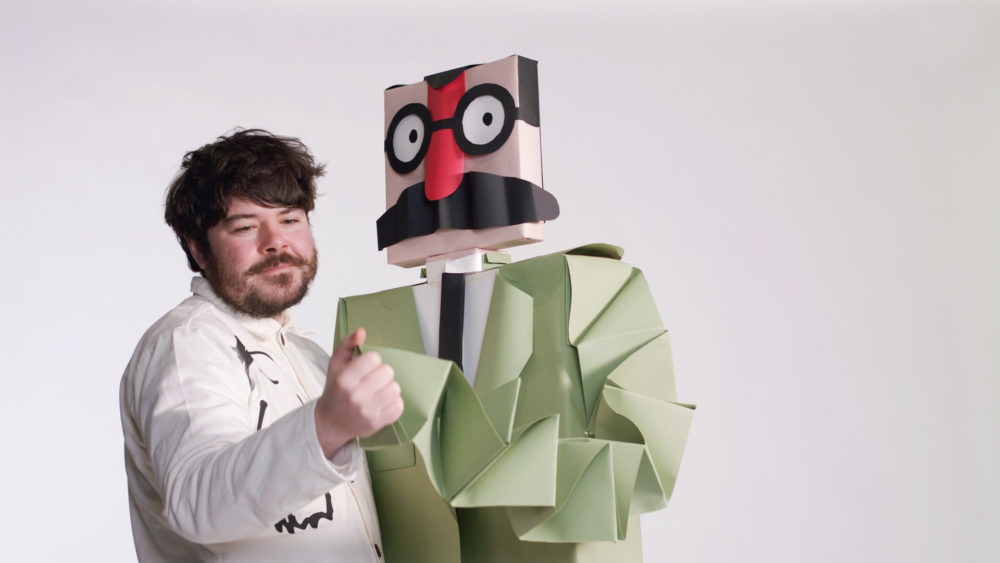Interview: Dafydd Owain discusses his critically acclaimed debut solo album and Cool Cymru 2.0

Stephen Price
Dafydd Owain’s debut solo album Uwch Dros y Pysgod was released to critical acclaim, gaining a coveted nomination for Welsh language album of the year.
He caught up with Nation.Cymru to discuss its influences, the ‘positivity’ of Welshness, the footie(!) and why Welsh artists need to forget basing their success on English merit.
Dafydd is a musician and composer hailing from north Wales. Known for his contributions to numerous bands such as Palenco, Bür Hoff Bau, Omaloma, Jen Jeniro and Eitha Tal Ffranco, Owain is now carving out a new path as a solo artist.
‘Uwch Dros y Pysgod’ is Owain’s first solo offering. The debut is a collection of semi-autobiographical songs set in an imaginary village of the same name. Owain tells his story through the trials and tribulations of ‘Uwch Dros y Pysgod’ imaginary inhabitants.
The album was recorded at Sain, Llandwrog, with the producer, Llŷr Pari (Omaloma, Melin Melyn, Bitw) and was released in May 2023 on I Ka Ching Records. The record was nominated for both the Welsh-language Album of the Year (Boduan National Eisteddfod 2023) and the Welsh Music Awards.
What does it mean to you to sing in Welsh? And do you sing bilingually at all?
That’s an interesting question. I grew up in an almost entirely Welsh language-speaking environment. The only time I spoke English was when we had English lessons in school, and that was pretty broken English at the best of times!
Even when I reached university in Cardiff, I still had a predominantly Welsh-speaking social circle and education. So in some sense, I don’t attribute a lot of meaning to it since speaking Welsh is as natural as anything to me.
I do, however, see myself as incredibly lucky to be able to speak and therefore sing in Welsh, especially when someone mentions that they’d love to be able to speak the language.
Those moments always make me realise how lucky I am to have been bought up through the medium of Welsh. It’s a rich and nuanced language and I have it under good authority that it’s a difficult language to learn. I’d love to be able to magically give people the ability to speak Welsh in a single click of fingers.
I have sung in English in the past but it’s always felt a little bit sloppy. I don’t see myself making a habit of it.
Tell us about your influences and the themes you like to work with..
My solo endeavours are mostly influenced by personal musings and experiences. 2023 was the year where I finally released my debut solo record, having been dabbling with the idea since 2012.
I released an album of works under the title ‘Uwch Dros y Pysgod’—a name I conjured for a fictional village which the album is based on (the village’s name crudely translates to Up Above The Fish). A lot of the album’s themes and influences are a complete ‘lobsgows’ of life-happenings told through the eyes of the village’s fictional inhabitants.
The village itself is influenced by the hunky-dory beauty of early 90s Welsh-language stop motion children’s cartoons but it’s got a darker twist to it.
A certain ‘Welshness’
I used to watch programmes like ‘Sam Tân’ and ‘Joshua Jones’ religiously as a child and found solace in their formulaic narratives—whatever the issue (normally a fire or a cat stuck up a tree), all would be resolved within the 10-minute episode and what felt like ‘end of the world’ events would suddenly disappear thanks to the heroic efforts of Sam Tân or Joshua Jones.
These narratives were never really a good reflection of how adulthood really is and that’s where the dark twist comes in. A certain ‘Welshness’ to the body of work surfaces in this regard, I suppose.

Delving into this idea of ‘Welshness’ in my work further, there’s no doubt that the likes of Gruff Rhys, Gorky’s Zygotic Mynci, Datblygu et al., have been pivotal to not only why I write music, but also the way I write and think about music.
I think all of those artists taught me how to be playful with my music and my ‘Welshness’. To be on the one hand incredibly proud of it, but on the other to challenge it often.
Bands like Adwaith have crossed over into the English speaking music world successfully, and it had been a while since we’ve seen any bands like SFA do that, why do you feel that this is happening right now?
This is a question I’ve been pondering for a while and never really come to a solid conclusion. I’m neither clever nor brave enough to give you a thorough sociological or political take, however we can’t deny that there is some serious ‘u k hun?’ vibes in the ‘UK’ right now.
Social division, mostly constructed, is at an all time high. Mainstream politics is vile. The media is weird. And after its rebrand, X is Xtra f***in annoying. Any reasonable person would turn to music to switch off—I know I do!
But why Welsh-language music? I’m not sure. The footie has definitely helped. Watching Dafydd Iwan’s ‘Yma o Hyd’ become the official unofficial anthem of Wales was fascinating and I’ve never experienced so much positivity and pride in claiming a Welsh identity as I have during the footie campaigns.
I was chatting with a Welsh-language tutor recently who said most of their class were there because of the national team’s success. Ian Gwyn Hughes is a genius and would make an incredible First Minister in my books.
Part of me thinks that this spirit—the spirit of positivity in ‘Welshness’, has spilled over into the minds of Wales’ musicians and songwriters.
It’s as if artists and bands aren’t afraid of singing in the language anymore—as if they don’t see it as restricting their popularity, aren’t afraid of ‘getting it grammatically correct’ and even see it as a bit of a USP.
Whatever their motivation to sing in Welsh or just simply claim a Welsh identity, it’s a joy to watch.
‘Anti-whatever-is-now’
There’s a tonne of Welsh bands that feel as if they’re reaching incredible heights right now from Gwenno’s Mercury-nominated Kernewek alt-anthems, Adwaith’s powerful rock-pop and Melin Melyn’s odd-pop ditties.
I’m a huge fan of Bitw who’s just released a blinder of an album called ‘Rehearse’. His videos are also incredible.
Another one to watch would be Pys Melyn who just released ‘Bolmynydd’—one of my favourite Welsh-language albums of all time I think.
You’ve also got the likes of Sage Todz whose Welsh-language drills reach incredible views on streaming platforms. Something’s in the water, undoubtedly.
Maybe there’s some authenticity to the whole thing, some carefree joy, some comfort, something that soothes and/or empowers, something that’s simply ‘anti’—I’m not sure.
I can’t put my finger on it but I do think the Welsh ‘identity’ is getting broader and maybe at its heart is a sort of ‘anti-whatever-is-now’. And maybe ‘Welshness’ is a great way of rebelling against the ‘now’. Whatever all this is, it looks as if it’s ticking boxes for people.

But I think it’s also worth addressing a certain elephant in the room in all of this which ties back to the question in hand—why do we even base Welsh ‘success’ on English merit? Isn’t it odd? Sometimes when I think about the ‘Cool Cymru’ thing it feels like a bit of a patronising English-media led thing-a-majig.
I believe, if there ever was a ‘Cool Cymru 2.0’, it should definitely park the idea of Welsh success being an English decision. In a weird way, Cool Cymru 2.0 is here, and it’s in Wales—and that’s cooler.
Your latest video looks quite complex – how long did it take to shoot?
Too long, probably. It took about five days if you include set production, WhatsApp corresponding, Zoom-calling, shooting, lunch-getting, editing and amending.
But it was all quite the experience. Since it was the title track for my debut album and based on the fictional village that the whole album delves into, I was keen to represent the village in some way or another.
The incredible talents of the brother-sister duo, Cai and Efa Dyfan, were bought in to build what was essentially a whole cardboard village within two days.
Cai told me that they built the village on their childhood home’s kitchen table and it was essentially a free for all in terms of grabbing any recyclable container, carton or can to build homes, shops, churches, windmills, park benches and cafes.
I still genuinely can’t believe how incredible a creation it was. Standing beside it or interacting with it was somehow a completely different experience to what it looks like on screen.
It was a shame that the thing was so big that it wasn’t practical to keep. It went to the local recycling centre a week after filming. The full circle of life and all that.

Some of the puppets, like the one I dance with in the middle-eight, were built by myself in my childhood bedroom. I hadn’t built anything like it before but my mam had just bought a gigantic flat screen TV and I had a decent takeaway-pizza habit at the time—plenty of cardboard to build something with.
I was deep into a Tom Waits-listening phase at that time as well, particularly the album ‘Mule Variations’ where there is a song called ‘What’s he Building?’, where Waits asks, ‘What’s he building in there?’.
I like to think that my family asked the exact same question as they heard the echoes of sellotape ripping, cardboard shearing and more than the occasional swear coming from behind the closed bedroom door.
The weird thing is, I still don’t quite know what exactly I was building in there.
You can stream Dafydd Owain’s album on all platforms, or purchase a digital copy via Bandcamp.
Support our Nation today
For the price of a cup of coffee a month you can help us create an independent, not-for-profit, national news service for the people of Wales, by the people of Wales.





